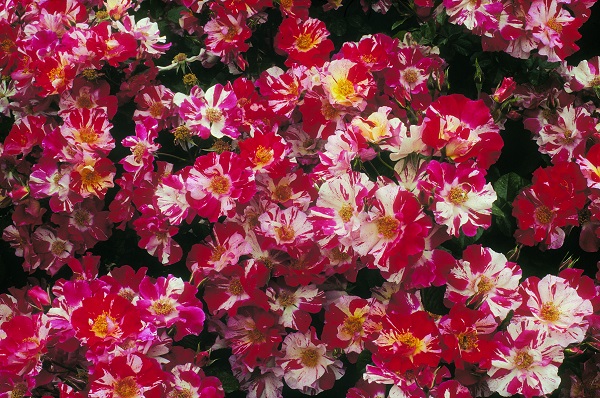
May is always such a great month for rosarians, no matter where you live. Warm-climate gardeners may already have seen their first bloom of the season, that glorious time when all the roses bloom at the same time. This, of course, is because you pruned the established plants all at the same time six or eight weeks ago.
Don’t forget to deadhead the spent flowers so that the new ones will come along quickly, keeping the garden always colorful and full of roses to be cut for the house or to give away. If you’re planning a special event such as a garden tour or a garden wedding, your best bet for having the maximum amount of bloom for the occasion is to prune all the plants back again, all at the same time, six to eight weeks before the event is scheduled.
For cold-climate rosarians, your plants should be growing strongly, the buds have set, and you’ll see the first bloom in early- to mid-June.
For all rosarians, it’s important to inspect the plants carefully and frequently, making sure that bugs, mites, and diseases are under control. As you know, there are very, very few perennials that grow and bloom all season long. This subjects them to an entire season’s worth of pests that can defoliate the plants. Roses (and other plants) need their foliage to photosynthesize, so keep them well watered, frequently fed, and pest free.
While all of us are trying to “go green,” roses need more fertilizer than organic fertilizers can provide. In fact, there’s never enough phosphorus, the middle number in the N-P-K analysis on your organic fertilizer container to keep rose flowers plentiful and big. It’s best to use a good inorganic fertilizer for roses, and supplement the soil with organic material such as compost, composted horse manure, fish emulsion, liquid seaweed, etc. Soil ‘wears out,’ becoming depleted of organic material over time. The addition of organic materials feeds the soil, keeping the good bacteria working to break down the inorganic materials and trace elements that are already in the soil and that are contained in the good liquid or water-soluble fertilizers that are formulated specifically for roses.
Over the course of a season of wind, water, weeding, etc., you’ll find that the level of the soil in your beds seems to drop. At least once a season, usually in the spring, I top dress all my beds with several inches of composted horse manure. That may be hard to find, depending on where you live, but regular compost is great, too. If you don’t make your own compost, chances are your municipality does. It’s usually very inexpensive to buy. And unlike horse manure, it doesn’t include a lot of weed seeds.
Not only should you add organic material to the soil in your rose beds on a regular basis, but all the water and fertilizer you use should be applied to the soil, not on the foliage. Wet water on rose leaves for any length of time attracts disease spores that attach themselves and start sucking the life out of rose foliage. Fertilizer sprayed on roses, no matter what you see on TV, can burn delicate foliage.
That’s not to say that rose foliage doesn’t enjoy a nice cool shower once in awhile, but rinse off the leaves only when the weather’s hot, and at a time of day when the leaves will dry off completely before nightfall.
Mulch, too, in some form, keeps rose soil moist for longer periods of time and suppresses weed growth. Always use organic mulch (not ground up rubber tires!) that will break down over time. Some mulches, particularly the bark mulches, are very acidic and will lower the pH of rose soil. So, check your soil frequently with some inexpensive litmus paper from your garden center, and add lime if the pH dips much below 5.8. On the pH scale, 5.8 to 6.3 is the optimum range for roses.
Ann Hooper is a certified American Rose Society Consulting Rosarian, who grows nearly 400 rosebushes at her home near Boston.
Related Articles & Free Email Newsletter Sign Up
3 Ways to Figure Out the Correcting Plant Time for Roses



Comment here